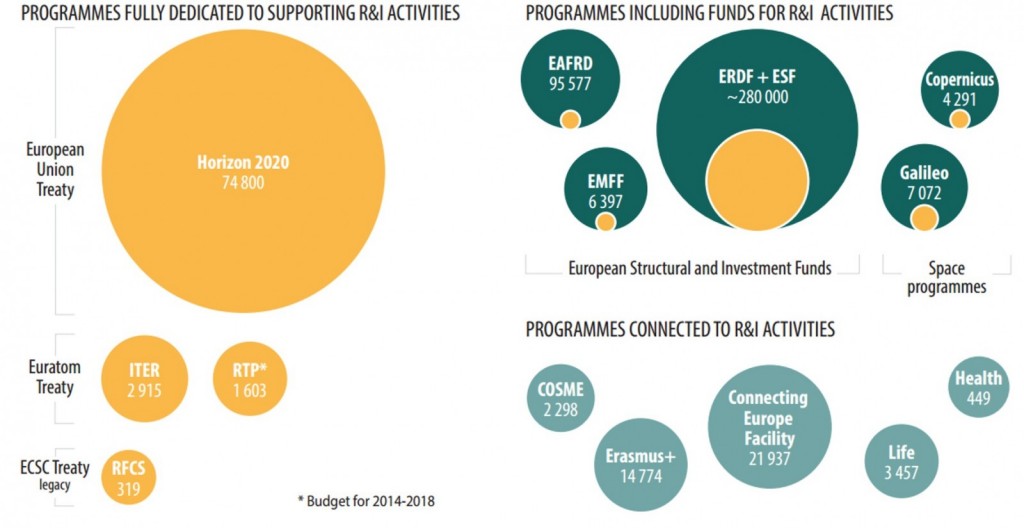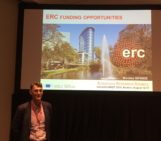
Are you thinking of applying for funding? Or are you considering a career in academia and want to know where your research funding could come from? The European Union (EU) has large financial resources available for academic scientific research and innovation (R&I). This is in addition to national government funding bodies. This blog post, the 5th in the EGU’s GeoPolicy series, introduces R&I funding policies in the EU, and lists the major funds available for EGU scientists.
The EU aims to ensure EU scientific research is at the forefront of knowledge discovery. EU member states are encouraged to invest 3% of their GDP by 2020 to provide funding for R&I. Its goals are to tackle the ‘challenges of our time’ (food security, energy demand, climate change, an aging population etc.) and to boost European economy through a single European Research Area [1].
The EU has a variety of interlinked programmes which offer funding for R&I. These are available to public and private sector organisations and total a staggering 130 billion euros. Funding for academics is primarily available through the Horizon 2020 (H2020) programme, although some other initiatives, which are sector focused, are also open to researchers. The figure below shows all EU R&I funding opportunities, and the amount each programme has to spend (in million euros).

Overview of EU programmes funding or connected to R&I activities and their respective budgets (in million euros) . Source: Multiannual Financial Framework, European Commission.
H2020 is by far the largest available funding resource for EGU academics. Some specific areas of EGU science have additional funding sources available. These include:
- Space: There are two programmes which offer funding for space related activities (in addition to H2020). The Galileo initiative aims to improve global satellite navigation, with the intention of launching over 300 satellites around Earth by 2020. Funding is available for R&I into the development of ‘fundamental elements of the satellite system’ i.e. electrical components. The Copernicus programme provides ‘accurate and reliable information and data in the field of environment and security’ using both satellites and in-situ equipment. Funding is available for the development of Earth observation techniques.
- Agriculture & forestry: The European Agricultural Fund for Rural Development provides grants for those performing research and innovation activities in the fields of agriculture, food production, and forestry.
- Research networks: The European Social Fund can be used for ‘the training of researchers and to support networking between research institutions’.
As a side note the EU also indirectly provides funding for students through the Erasmus+ scheme to relocate ‘in the pursuit of education and training opportunities’. [2]
H2020
H2020 offers funding for successful applications that meet some of their policy objectives. There is little under 75 billion euros available for R&I. The H2020 subsections which are relevant to EGU scientists are listed below:
- Excellent Science
- Industrial Leadership
- Societal Challenges
- Spreading Excellence and Widening Participation
- Science with and for Society
How to apply
The video below gives a basic introduction to applying for H2020 funding. [3]
Funding for research grants (i.e. from the ERC or a Marie Skłodowska-Curie grant) is done through the Participant Portal. This is where scientists can submit a research proposal of their own design. Alternatively, funding for specific projects, proposed by the EU, can be applied for through the Calls for Proposals webpages. Calls are uploaded to this website throughout the running of H2020 (2014-2020) so it is worth regularly checking for recently postings. [4]
The application process involves submitted proposals to be evaluated by academic and industrial experts, rather than European Commission employees. More information about the application process can be found here. Academics who wish to apply as a registered expert to review research proposals can find more information here.
—
Edit: The Marie Curie Alumni Association website lists 10 direct links where european research funding can be found.
—
Sources used for this blog post
[1] – http://europa.eu/pol/rd/
[2] – http://www.europarl.europa.eu/RegData/etudes/BRIE/2015/568327/EPRS_BRI(2015)568327_EN.pdf
[3] – https://www.youtube.com/watch?v=mmN0NccQCD0
[4] – http://ec.europa.eu/research/participants/portal/desktop/en/home.html





Pingback: GeoLog | GeoPolicy: Have your say on Horizon 2020